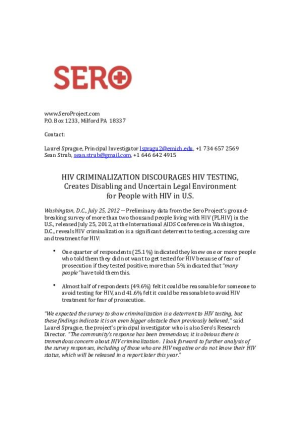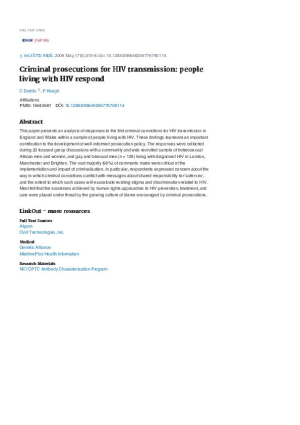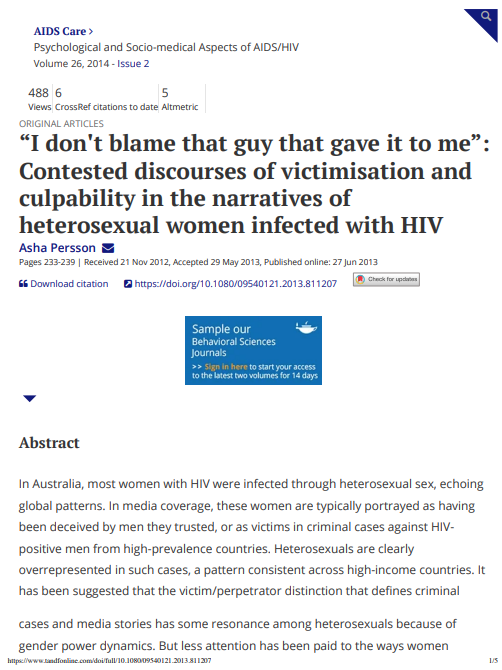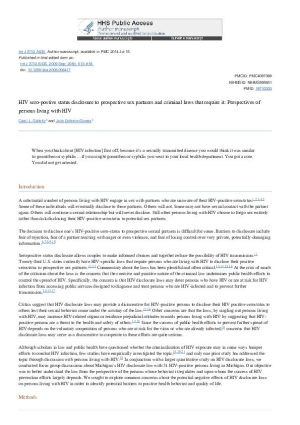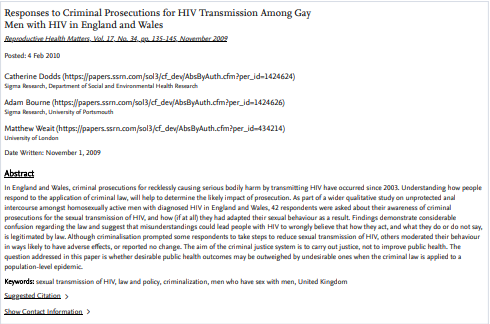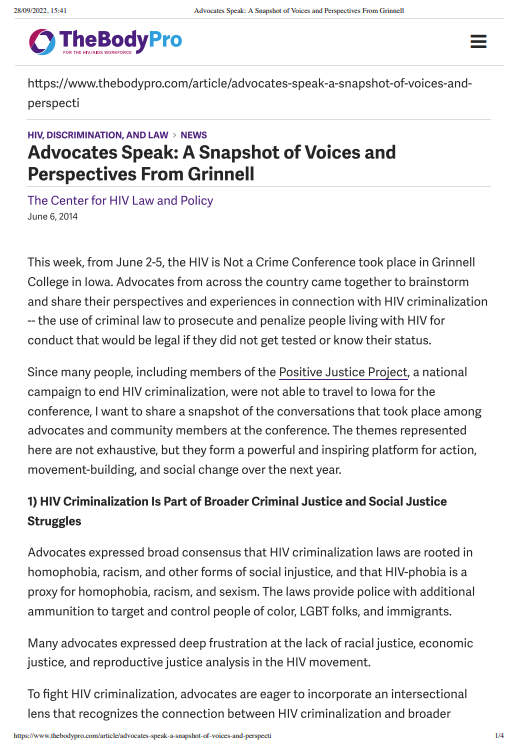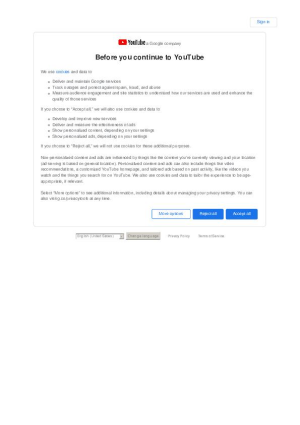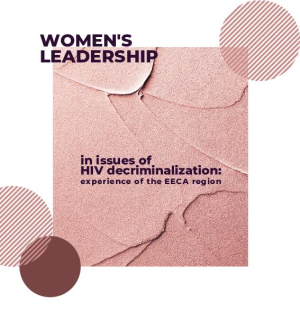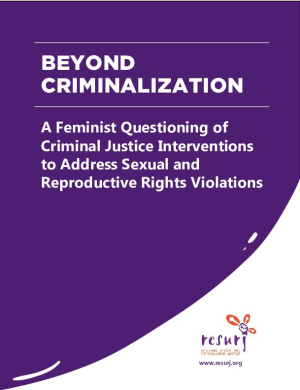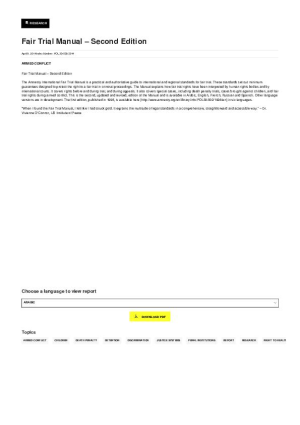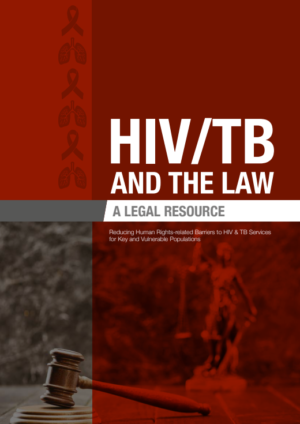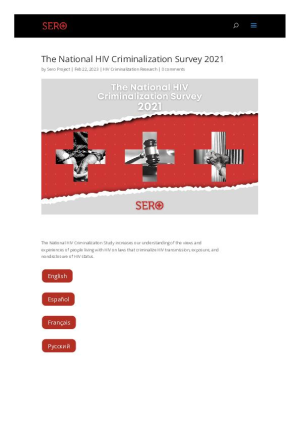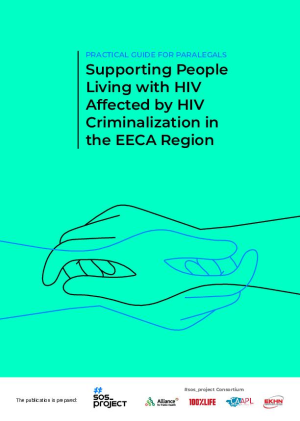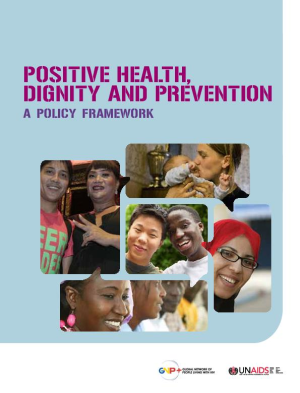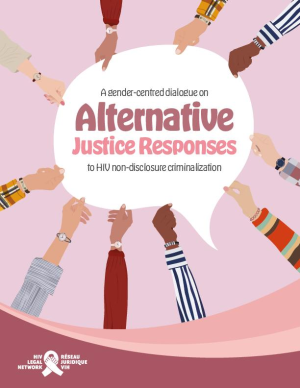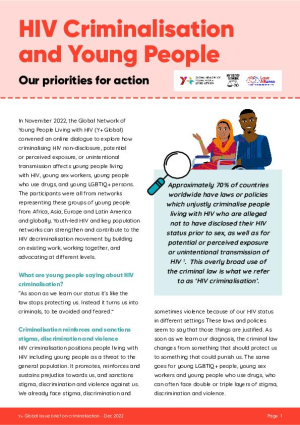Survey of more than 700 PLHIV found that almost half felt it was somewhat reasonable or very reasonable to avoid testing because of fear of prosecution.
Advocacy and activism
Listening to and supporting affected communities
Criminal prosecutions for HIV transmission: people living with HIV respond
Considers how people with HIV responded to the first criminal convictions for HIV transmission in England and Wales. The vast majority were critical of criminalisation, expressing concern that prosecutions conflict with ‘safer sex’ shared responsibility messaging, and exacerbate existing stigma and discrimination. Most felt a growing culture of blame undermined the successes achieved by HIV- human rights approaches.
“I don’t blame that guy that gave it to me”: Contested discourses of victimisation and culpability in the narratives of heterosexual women infected with HIV
Considers how heterosexual women living with HIV make sense of their HIV acquisition, challenging the victim–culprit binary. None of the women interviewed presented themselves as ‘victims’ in any straightforward sense or placed the blame squarely on the men who likely infected them, including men who had not disclosed. Instead, the women’s narratives revealed themes of “mutual vulnerability” and far more ambivalent allocations of responsibility. The tendency to position women who become infected with HIV as ‘victims’ obscures the complex realities of gender and sexual practice.
HIV seropositive status disclosure to prospective sex partners and the criminal law that require it: Perspectives of persons living with HIV
Reports on HIV-positive persons’ focus group discussions about Michigan's HIV disclosure law. Themes included perceived responsibility to prevent infection, concern about unwanted secondary disclosure of HIV-positive status, fear of being falsely accused of violating HIV disclosure law, and perceived vulnerability of HIV-positive persons within the US legal system. Although many agreed with the purpose of the HIV disclosure law, there was considerable concern about the negative impact of the law on persons living with HIV.
Responses to criminal prosecutions for HIV transmission among gay men with HIV in England and Wales
Considers respondents’ awareness of HIV prosecutions and how they have adapted their sexual behaviour as a result. Demonstrates considerable confusion regarding the law, suggesting misunderstandings could lead people with HIV to wrongly believe that how they act, and what they do or don’t say, is legitimated by law. Although criminalisation prompted some to take steps to reduce risk of HIV transmission, others moderated their behaviour in ways likely to have adverse effects, or reported no change.
Consent: HIV non-disclosure and sexual assault law
In their own words, eight women — leading feminist scholars, attorneys and women living with HIV — shine a light on the problems of using sexual assault law to prosecute alleged non-disclosure of HIV. Does the legal concept of consent, intended to protect women’s sexual autonomy, in fact increase their risk of violence and discrimination when used to criminalize HIV?
Advocates Speak: A Snapshot of Voices and Perspectives from Grinnell
This blog post from the Center for HIV Law and Policy highlights a number of themes reflected by participants at the first HIV is Not a Crime training in Iowa, 2014.
Through our eyes
Photo essay drawing on photographs and narratives created as part of an ongoing community-based photo-voice project visually exploring the gendered dimensions of HIV stigma, disclosure, and criminalization among diverse groups of women and transgender people living with HIV in Vancouver, Canada
True Not Crime Story
Series of 4 videos from criminalisation survivors sharing their story to help others avoid their unfair experiences with the criminal justice system and HIV stigma. The videos are meant as a reminder of why these harmful HIV laws that still exist in over 30 states need to be modernised.
A Spectacle of Stigma
A First-hand Account of a Canadian Criminal HIV Exposure Trial
Women’s Leadership in issues of decriminalization: Experience of the EECA region
The compendium brings together research from the women's community, examples of documented personal stories and court cases. All the collected materials demonstrate how criminalisation of HIV is a global problem and how it is linked to gender-based violence. Experts believe that criminalising laws do not protect against HIV infection, but only make women worse off in society.
- Alternative links
- Женское лидерство в вопросах декриминализации ВИЧ: опыт региона ВЕЦА
Positive Transformation
Toni-Michelle Williams, the executive director of the Solutions Not Punishment Collaborative (SNaP Co.), a Black trans- and queer-led organization working to build safety, leadership and political power, explores alternatives to the historically violent and biased U.S. policing system—including restorative and transformative justice models.
Positive sexuality: HIV disclosure, gender, violence and the law—A qualitative study
Drawing on a feminist analytical framework and concepts of structural violence, this analysis sought to characterize the negotiation of sexual relationships and HIV disclosure among Women Living with HIV (WLWH) in a criminalized setting. Researchers conducted 64 qualitative interviews with cis and trans WLWH in Vancouver, Canada between 2015 and 2017. Despite frequently being represented as a law that ‘protects’ women, the study findings indicate that the criminalization of HIV non-disclosure constitutes a form of gendered structural violence that exacerbates risk for interpersonal violence among WLWH. In line with recommendations by, the WHO and UNAIDS these findings demonstrate the negative impacts of regulating HIV prevention through the use of criminal law for WLWH.
The Criminalization of HIV Non-Disclosure – Experiences of people living with HIV In Canada
This is the first known qualitative research study in Canada examining the phenomena of criminal and public health charges for HIV non-disclosure from the perspectives of those who have lived it.
The project examined the experiences of people living with HIV who were charged, prosecuted, or threatened with criminal and public health charges in Canada because they had been alleged to not tell sex partners of their HIV-positive status. The project was conducted between January 2016 to January 2019.
Beyond Criminalization: A Feminist Questioning of Criminal Justice Interventions to Address Sexual and Reproductive Rights Violations
The report presents the findings of the desktop research lead by the global south feminist alliance RESURJ, (Realizing Sexual and Reproductive Justice), as part of the alliance's leadership work on the shortcomings and limitations of penal policies in addressing sexual and reproductive rights violations. The aim of the review and this analytical report is to strengthen RESURJ’s evidence base on sexual and reproductive justice and to further engage with diverse feminists and groups to reimagine alternatives to criminalized approaches, alternatives that put human rights and justice at the center.
Fair Trial Manual – Second Edition
This Manual seeks to provide a practical guide to the relevant human rights standards for anyone involved in examining how well a criminal trial or a justice system meets international standards of fairness. It is intended for the use of trial observers and others assessing the fairness of an individual case, as well as for anyone seeking to evaluate the extent to which a country’s criminal justice system guarantees respect for international standards of fair trial. It may also serve as a guide for law makers, judges, prosecutors and defence lawyers or as a training tool.
Reducing Human Rights Related Barriers to HIV & TB Services for Key and Vulnerable Populations: Legal Support Resource
The legal support resource is part of an on -going human rights programme with the goal of reaching key and vulnerable populations by utilising customised and targeted interventions. These interventions include activities on (1) legal empowerment;(2) training of paralegals on issues related to HIV, TB and human rights; (3) legal and paralegal support to community members whose human rights have been violated including pursuing identified matters to court; and (4) sensitisation of judiciary, law makers and traditional leadership especially those involved in traditional courts.
It gives practical information on current and evolving legislation, common law and policies pertaining to HIV and TB in South Africa. The aim is to educate, sensitise and provide updated information to paralegal and legal practitioners alike, who are engaged in offering legal advice and services to individuals and communities who serve members of the vulnerable and key populations.
The National HIV Criminalization survey 2021
The National HIV Criminalization Study increases our understanding of the views and experiences of people living with HIV on laws that criminalize HIV transmission, exposure, and nondisclosure of HIV status. The data in this report summarize the experiences of PLHIV in the US. Data were collected by Sero Project and community partners from August to December 2021. A
8th Symposium on HIV, Law and Human Rights
The report of the HIV Legal Network's 8th HIV, Law and Human Rights Symposium held in 2019 summarizes the discussions of the Forum where survivors of HIV criminalization shared their experiences and where experts in the field presented updates on the current state of HIV criminalization in Canada, the latest scientific developments surrounding HIV transmission and the future of advocacy efforts in the country.
PRACTICAL GUIDE FOR PARALEGALS: Supporting People Living with HIV Affected by HIV Criminalization in the EECA Region
The purpose of this guide is to raise the legal awareness of activists from the community of people living with HIV who provide paralegal assistance to people affected by the criminalisation of HIV. This guide is also recommended for use by activists from key populations - people who use drugs, sex workers, and representatives of the LGBT community. This manual reflects the experience of the HIV-positive community members, as well as their partners and associates from across Eastern Europe and Central Asia (EECA), in providing direct assistance to HIV-positive people affected by discriminatory HIV-specific laws and the decriminalisation of HIV.
Positive Health, Dignity and Prevention: A Policy Framework
Positive Health, Dignity and Prevention highlights the importance of placing the person living with HIV at the centre of managing their health and wellbeing. The Positive Health, Dignity and Prevention Framework requires a concerted multisectoral effort to work towards removing punitive laws and passing more laws that support and enable policies in favour of expanding programmes proven to reduce new HIV infections while protecting the human rights of people living with HIV and those who are at higher risk of exposure to the virus.
A gender-centred dialogue on alternative justice responses to HIV non-disclosure criminalization
This report represents a synthesis of cross-sector discussions during a roundtable about alternative justice responses to the criminalization of HIV non-disclosure in Canada, as well as findings from the research and previous community engagement.
- Alternative links
- Français
Issues and prospects of disclosure of HIV status to sexual partners in Niger
The purpose of this study undertaken by RENIP+ was to organise a public consultation on the issue of disclosure of HIV status to sexual partners in order to lay the groundwork for the substantive and procedural requirements of an accompanying process to guide the development of national guidelines on this issue. Based on the main findings of the study, the report makes several recommendations.
Please note: This document was machine translated from French with DEEPL.com
- Alternative links
- Français
HIV Criminalisation and Young People
In November 2022, the Global Network of Young People Living with HIV (Y+ Global) convened an online dialogue to explore how criminalising HIV non-disclosure, potential or perceived exposure, or unintentional transmission affects young people living with HIV, young sex workers, young people who use drugs, and young LGBTIQ+ persons. The participants were all from networks representing these groups of young people from Africa, Asia, Europe and Latin America and globally. Youth-led HIV and key population networks can strengthen and contribute to the HIV decriminalisation movement by building on existing work, working together, and advocating at different levels.
Stakeholder views on the relationship between human rights and the law in addressing the HIV epidemic in Papua New Guinea
This article draws on a qualitative study conducted in Papua New Guinea (PNG) which examined stakeholder views on prospects for law reform, the impact of criminal laws on communities, and the role of law reform in addressing the HIV epidemic. While efforts to reform criminal laws related to sex work and male-to-male sex have taken place in PNG, these have been unsuccessful. Stakeholders identified that strategies for addressing criminal laws and the impacts of law reform must be grounded in the PNG context, that there must be material support for community members to engage with criminal laws and human rights, and that dignity rather than HIV should be the justification for law reform.

